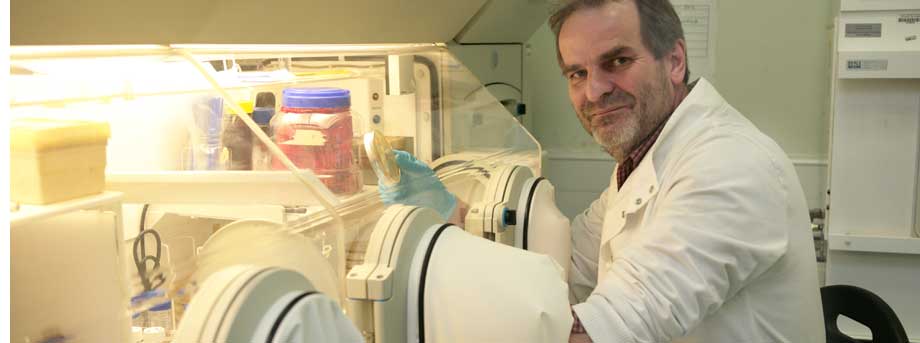Tackling Toxin A
September 29th, 2010

Scientists at the University have re-established the lethal role of a toxin in the leading healthcare associated infection Clostridium difficile.
In a paper published in the prestigious journal Nature, the Nottingham team has proven that Toxin A — one of two known disease-causing factors in Clostridium difficile — can kill on its own without working in tandem with the other associated virulence factor, Toxin B.
The results contradict those published last year in the same journal which suggested that only Toxin B was essential, and that Toxin A alone was not capable of causing the disease.
The new study has major implications for the development of new vaccines, drugs and diagnostic equipment for the prevention, treatment and detection of Clostridium difficile.
Prof Nigel Minton, head of the Clostridia Research Group in the School of Molecular Medical Sciences, said: “For many years it has been assumed by the scientific community that Toxin A and Toxin B worked hand-in-hand to cause fatalities by Clostridium difficile, although historically Toxin A was believed to be the most deadly factor.
“Last year a study was published that turned this on its head and appeared to prove that
Clostridium difficile strains producing Toxin A alone were innocuous, and that only Toxin B was essential for disease.
“This had significant implications — already we have seen a move within the diagnostics industry to develop new methods of diagnosing Clostridium difficile that rely entirely on targeting Toxin B.
“Our research, which has recreated that original experiment, resulted in a different outcome — we were able to show in the laboratory that the mutated Clostridium difficile strain, which produced only Toxin A, was deadly.”
Clostridium difficile infection is the most significant cause of hospital-acquired diarrhoea and is seven times more deadly than MRSA. The bacterium is present in the gut of up to three per cent of healthy adults and 66 per cent of infants.
Usually it is kept in check by the healthy balance of bacteria in the gut, but when this is disturbed by certain antibiotics Clostridium difficile can multiply rapidly and produce toxins that cause illness and death. The disease is spread through spores, usually from poor hygiene.
Tags: Clostridia Research Group, Clostridium difficile, hospital-acquired infection, MRSA, Prof Nigel Minton, School of Molecular and Medical Sciences, superbugs
Leave a Reply
Other News

Need news? See you on SharePoint
After 14 years of service, Campus News is being retired as the university’s staff news platform. […]

Roads and car parks closed for refurbishing work
As part of ongoing road improvements at the university, works will be taking place to resurface […]

